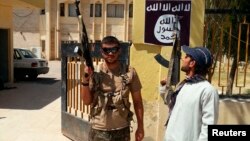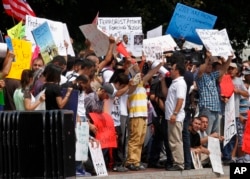The United States is weighing a range of options in Iraq, where Islamic extremists have seized Iraq's largest dam and significant parts of the northern region, resulting in a wave of refugees in the area.
State Department spokeswoman Marie Harf says Washington is extremely concerned about the situation, describing it as a "huge humanitarian crisis."
Harf said the U.S. is looking at a range of options. She said the U..S is "actively considering" what else it can do, given the extremely grave situation on the ground.
But senior US officials have said there will be no American military combat troops on the ground.
"The situation is nearing a humanitarian catastrophe," said White House spokesman Josh Earnest. "We are gravely concerned for their health and safety."
The White House called the dire humanitarian situation in Iraq a consequence of a broader failure of Iraqi political leaders.
But Earnest stressed that "there are no American military solutions to the problems in Iraq."
He said solutions to the humanitarian crisis near Sinjar "will only come through political reforms."
Earlier Thursday, Earnest declined to confirm a report published by The New York Times Thursday that said U.S. President Barack Obama is considering airstrikes and emergency relief airdrops to help 40,000 religious minorities in Iraq who are trapped on a mountaintop after death threats by Islamic militants.
But he said the Islamic fighters in northern Iraq have displayed a "callous disregard" for human rights.
While the White House did not publicly outline the range of options under consideration, officials said the U.S. strongly condemns the extremists' assault on minorities, including the Yazidis, who follow an ancient religion with ties to Zoroastrianism, and Christians.
President Barack huddled with his national security team Thursday to discuss the Iraq crisis.
Militants gain ground
The Sunni extremists who now call themselves the Islamic State have taken over large swathes of territory in northwestern Iraq and neighboring Syria. The group has imposed a strict form of Islamic law in the area, enforced through beheadings, amputations and crucifixions.
The group also has issued an ultimatum to tens of thousands of Iraqis from the Yazidi community, which follows an ancient religion with links to Zoroastrianism. Many of the Yazidis fled to the Sinjar Mountains.
The Islamist fighters have killed many thousands and declared a caliphate in the area they conquered.
Considered more extremist than al-Qaida, the Islamic State also has also threatened to capture the capital, Baghdad.
Car bombings in two busy Baghdad markets killed at least 47 people Wednesday. One of the blasts was in the majority Shi'ite neighborhood of Sadr City.
Amnesty International says access is impossible to areas under IS control, and in surrounding areas where fighting with Kurdish forces is ongoing.
The group reports that hundreds of civilians from Sinjar are feared feared dead or abducted after they were attacked by IS militants.
The Security Council, which says the Islamic State forces sweeping through northern Iraq threaten regional peace, security, and stability, warned this week that the group's persecution of minorities could bring charges of crimes against humanity.
The Council on Thursday called an emergency meeting to address the sitiation. And Pope Francis is appealing to the international community to help end what he called the "humanitarian tragedy" in Iraq.
Plight of the minorities
Tens of thousands of people have been displaced by the latest fighting, in which militants from the group known as the Islamic State (formerly ISIL) captured a dam providing water and electricity for millions of people in and around Mosul, and overran several predominantly Christian towns.
Sunni extremists made major gains in Iraq's north, taking control of areas that had been under the protection of Kurdish Peshmerga fighters, as well as capturing two oilfields near the Syrian and Turkish borders.
Witnesses say Islamic militants carried out an overnight offensive near the semi-autonomous Kurdish region of Iraq, seizing several towns, including Qaraqosh Tal Kayf, which have large Christian populations, and Sinjar, whose Yazidi minorities were forced to flee with little food or water.
The plight of the Yazidis is among the most pressing concerns. Thousands fled their homes for the mountains after the Islamic State group issued an ultimatum to convert to Islam, pay a religious fine, flee their homes or face death.
Some of the many thousands trapped on Sinjar mountain have been rescued in the past 24 hours, a spokesman for the U.N. Office for the Coordination of Humanitarian Affairs said earlier, adding that 200,000 had fled the fighting.
If Obama were to approve humanitarian assistance to the Yazidis and others, it could be delivered via airdrops by the U.S. military. The military could also advise and assist the Iraqi air force on where and how to deliver humanitarian relief supplies.
A defense official told VOA: "We have been working urgently and directly with officials in Baghdad and Irbil to coordinate Iraqi airdrops to people in need. The government of Iraq has initiated air drops in the region and we are in constant communication with them on how we can help coordinate additional relief, enhance their efforts, and provide direct assistance wherever possible."
Yazidi population
Just a week ago, Yazidis living in their ancient homeland of Sinjar in northern Iraq felt protected by Kurdish peshmerga forces. Followers of an ancient religion derived from Zoroastrianism, the Yazidis are themselves Kurds.
The peshmerga - “those who confront death” - had acquired reputations as fierce warriors who once took on Saddam Hussein's troops. But they gave way before the Sunni militants, who had seized tanks and armored personnel carriers from the Iraqi military when they swept through the north in June.
Iraq's U.S.-trained and funded army crumbled, leaving the Kurds and Shi'ite militias to fight back against Sunni militants, who were gaining momentum after launching a weekend offensive.
The Yazidis appear to be paying the heaviest humanitarian price for the ambitions of the Islamic State.
“Most of the families were stopped by Islamic State militants while they were leaving and the militants killed men. Some were beheaded,” said Abu Ali, 38, who was hiding with tens of thousands of others on Sinjar Mountain.
“One of the saddest stories was one of our relatives. They beheaded all his 15 family members in front of him and then took him with them.”
Yazidi women were hauled away for forced marriages, or perhaps slavery, as in other towns. “Some were taken to Syria,” Abu Ali said.
Many of Yazidi villages were destroyed years earlier when Saddam Hussein's troops tried to crush the Kurds. Some were abducted by his security agents. Now they are on the defensive again.
Witnesses reached by telephone said about 100 babies died from thirst in mountains infested by snakes and scorpions. But coming down from the mountains and returning to Sinjar is a risky option.
Minorities forced to conform
In other places they have captured, Islamic State militants have imposed their radical view of Islam - women must wear a full-face veil, Shi'ite mosques must be dynamited, “infidels” eliminated.
Minorities have little chance of surviving unless they conform. Nareen Shammo, a Yazidi activist, said families who stayed behind in Sinjar were forced to convert to Islam.
“Five hundred women were kidnapped. Some of them were sold in an auction at low prices and others were forced to marry militants,” Shammo said.
Amnesty International said panic was gripping northern Iraq.
“Many members of minorities are even fleeing areas where there seems to be no imminent danger of an ISIS attack as they are so traumatized by their recent displacement,” said Donatella Rovera, Amnesty International's senior crisis response adviser, who is currently in northern Iraq.
Aid to Kurdistan
The Kurdistan Regional Government has appealed for support in its efforts to counter the extremists.
"It is now time for the international community to step forward, urgently, and provide the KRG with humanitarian assistance and military support, particularly air support," Kurdish Minister Falah Mustafa said on the KRG's website.
Bernadette Meehan, spokeswoman for Obama's National Security Council, told Reuters on Wednesday that any provision of U.S. weapons to the Kurds “must be coordinated with central government authorities, in Iraq and elsewhere.”
But she added that given the threat from the Islamic State “the United States will continue to engage with Baghdad and Irbil to enhance cooperation on the security front and other issues. We are in continuous consultation with the government of Iraq and the Kurdistan Regional Government to determine how they can best coordinate” to confront the militants.
She said Washington fully supported a decision earlier this week by Baghdad to send air support to Kurdistan.
Jeff Seldin contributed to this report from the Pentagon. Some information for this report provided by Reuters and AP.






